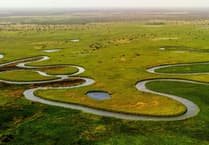Have you ever had a Dartmoor moment?
If you’re not sure what it is, I recently read it described as the moment you realise “you’ve gone wild”... when “lost doesn’t quite cover it and you find yourself in harsh country, far away from the chocolate-box villages on the moor’s edge”.
Reading this got me thinking about my Dartmoor moment. And what was strange was the one that immediately sprung to mind wasn’t from a time when I was lost or far from civilisation.
It came in 2023 when I joined thousands of others up on Stall Moor to raise Old Crockern in protest against a high court ruling which had decreed that people did not have the right to wild camp on Dartmoor without the landowners’ permission.
Earlier this month, I saw many of those I was with on that blustery February day in London outside the Supreme Court, where a few feet away from us hearings were beginning in the latest instalment of the long-running legal case, Darwall v Dartmoor National Authority.
And what I said then bears repeating: Access to nature is not a nice to have. As human beings, it is a fundamental necessity for us to stay sane in our modern world.
That’s not just my personal opinion, by the way - the science backs it up. Again and again, it’s been found that physical activity in nature results in reduced negative emotions and fatigue, increased energy, improved attention, as well as greater life satisfaction overall.
Yet in England we only have a right of access to 8% of the land and uncontested rights to 3% of our rivers. Over 150 constituencies in England have no real right to roam at all, while the rest only have tiny percentages.
Dartmoor – at the time of writing – is the only national park where wild camping is permitted, and, depending on the outcome of this latest hearing, that right could be removed.
The strangeness of that possible outcome is worth dwelling on. We know mental health is one of the crises of our times, we know too that being in nature is good for our mental health, and yet, we could find ourselves in a situation where our access to nature is curtailed even further than it already is.
As anyone who goes onto Dartmoor will know, there is no such thing as a single Dartmoor moment. While I shared a specific one earlier, the truth is I could have told you about the time I went with my family and best friend to Haytor to watch the sun rise on New Year’s Day, or the many times I took my daughters up there to run off steam and marvel at the ponies and scramble on the Tors.
I’m sure many of you will have fond memories of camping under the stars, of watching the sun set and rise again, of your children taking part in Duke of Edinburgh or Ten Tors challenges, of them experiencing the risk, the thrill, the specialness that only Dartmoor can offer.
While Dartmoor means different things to different people, it belongs to all of us. We must absolutely protect this right to wild camp, and, I hope, extend it to other wide-open spaces across England.





Comments
This article has no comments yet. Be the first to leave a comment.